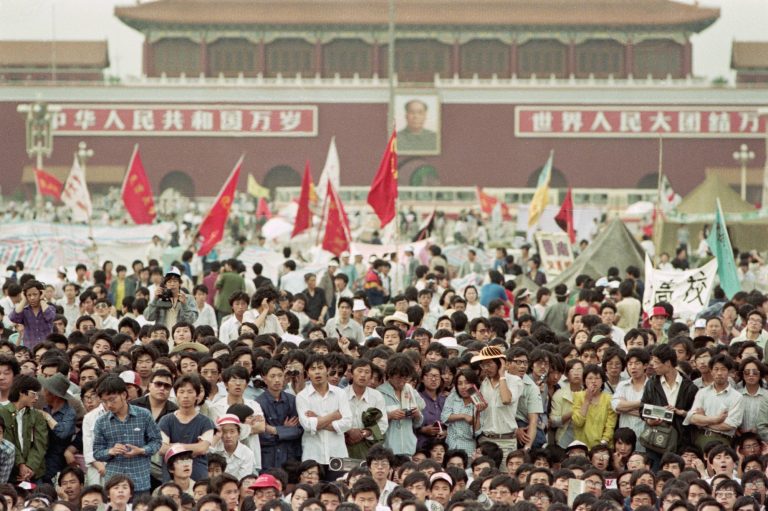China’s 10-year experiment with political reforms came to a head in the early months of 1989, when thousands came out to commemorate the death of Hu Yaobang, the ousted general secretary of the Chinese Communist Party.
Hu’s death on April 15 sparked particularly strong emotions among Chinese intellectuals and youth, for he was a prominent liberal in the CCP establishment under paramount leader Deng Xiaoping. For many Chinese, Hu had personified the hope that China could shift from authoritarianism to democracy.
However, what began as a commemoration of a deceased reformer soon escalated into nationwide demands for more popular rights, government accountability, and even democratic institutions. Throughout May, hundreds of thousands of people gathered in China’s cities, most famously at Tiananmen in central Beijing.
The Tiananmen protests, which occurred in the backdrop of similar popular movements that were in the process of bringing down the Soviet-backed communist regimes in eastern Europe, alarmed the CCP leadership. Egged on by hardliners, Deng Xiaoping imposed martial law in Beijing, and on the night of June 3-4, Chinese People’s Liberation Army soldiers fired on masses of protesters in Tiananmen and the surrounding area.

The ‘Tank Man’ blocks tanks leaving the site of the Tiananmen Square Massacre in the morning of June 5, 1989. (Image: Michael Mandiberg flickr / CC BY-SA 2.0)
In the West, the photo of the lone “Tank Man” standing down a column of advancing PLA tanks on the streets is a well-recognized symbol of resistance. But for most Chinese today, living 30 years after the bloodshed that occurred in the center of their nation’s capital, the legacy of Tiananmen is a phantom episode of history, torn between activist voices, regime propaganda, and fading memories.
Success
You are now signed up for our newsletter
Success
Check your email to complete sign up
‘Killing 200,000 in exchange for 20 years of stability’
While activists in Hong Kong, the former British colony that still retains some of its autonomous rights, dutifully organize memorial gatherings to mourn the victims of the Tiananmen Massacre, the events of June 4, 1989, are subject to an Orwellian exercise of reality control and historical revisionism on the mainland.
Apart from censoring all available information regarding the protests, CCP-paid Internet trolls, known as wumao, further muddle the waters by offering false or misleading accounts of the protests. And what cannot be denied is simply brushed off as irrelevant in the great flow of China’s supposed rise.
In the years after the Tiananmen Massacre, Deng Xiaoping resumed his reforms, though the political content was now the third rail: In an infamous speech, Deng claimed that it was worth it to “kill 200,000 people in exchange for 20 years of stability.” To be sure, this was an exaggerated figure, based on the Chinese convention of counting large numbers by the tens of thousands. But the point was clear: Making money was okay, as long as it didn’t interfere with the rule of the Communist Party.
Deng’s logic has been acted out at a dramatic scale and with mind-boggling intensity. Starting in the 1990s, under the leadership of CCP leader Jiang Zemin, Party officials were officially permitted to get involved with a business, marrying the authoritarianism of the Communist Party to full-on commercialism. Jiang called upon cadres to “keep quiet and make huge fortunes,” something they did at any cost.
Under the blanket of China’s economic rise — from having a GDP comparable in size to that of Tokyo in the 1990s to being the second in place behind the United States — the CCP only reinforced its totalitarian means. Jiang Zemin’s persecution of the popular Falun Gong spiritual practice opened up the door to repressions of other politically undesirable groups, and the influx of money gave Beijing access to a wide range of upgrades for its modern authoritarian state. The list goes from Western-sourced computer chips used in the Huawei-built mass surveillance systems, to immunosuppressant drugs for transplants of organs harvested from prisoners of conscience.
The dead end of communism
The consequences of Tiananmen and the bloody end of political reform are apparent. Like advanced Western democracies, China has become an increasingly materialistic society, with endlessly rising levels of consumption and veneration of socioeconomic status. The Communist Party no longer claims to represent the people on account of Marxist merit, but in accordance with how rich it can make them.
Today, the Chinese model of development is hitting the wall. In December, establishment economist Song Xiangzuo warned that China’s actual GDP growth could be at or near zero, rather than the 6 percent claimed in official figures. Tariffs on Chinese exports imposed by the Trump administration have highlighted the inherent weaknesses of the Chinese economy, from lack of enforceable laws to suppressed innovation and heavy-handed interventionist policies designed to cement the Communist Party’s power.

Chinese president Xi Jinping presides over a steep economic decline and the Communist Party’s widespread human rights abuses. (Image: Jane Wittoeck via flickr CC BY 2.0 )
For current Chinese president Xi Jinping, there is no easy way out of this downward spiral as long as the communist system remains in place.
Attempts by the CCP leadership to harken back to the revolutionary legacy of founding communist leader Mao Zedong invite only ridicule, while any serious implementation of structural economic reforms invites immediate backlash from entrenched Party elites, who fear losing the benefits they derive from authoritarian power.
Though Xi has used the banner of anti-corruption to consolidate power within the Party to a high degree, he does so at the expense of rank-and-file CCP officials, as well as the elites who belong to Xi’s factional rivals, inviting widespread resentment and insubordination.
Meanwhile, Xi’s posturing as a strongman leader has only given the growing number of outside observers a human face to blame for the massive crimes of the Communist Party-state.
Follow us on Twitter or subscribe to our weekly email















